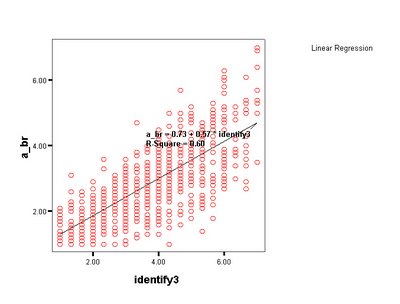We Still Like Ourselves
Today was spent on preliminary data analysis for the ongoing brand attitudes study. In this study, we showed participants 32 different brands (16 per participant) and asked them to answer 31 semantic differential questions about their attitudes. These are 7-point scales that are something like:
where you indicate your attitude by selecting one of the 7 points. Among those 31 questions, there were questions about how positive the ads were, how arousing the brands were, and the extent to which participants identified with the brands (e.g., like me / not like me).
What surprised me during pretesting is that the degree to which we thing a brand is good cannot be separated statistically from the degree to which we think it is like us. If it is like me, it is a good brand. Now we 53 actual research participants in the computer, the same results hold. If we compare the attitude toward the brand scale (alpha = .92) to the identity scale (alpha = .83), we see a correlation of .67.
To see what this looks like, here is a scatterplot of the two scales. Note the correlation between the two variables. The barely visible trend line helps a bit.

To me, the implications of these results are fascinating. We don't just use Tide because it cleans well. We don't just use Tide because our mom used it (mine does!). Instead, we come to see Tide as like us. Think about that for a moment. We assign (or accept) some sort of personality to a brand, and then we come to see that personality as like our own. I'm no personality psychologist, but this must be similar to what we do with our friends. I could introduce you to my friend Johnny or my friend Starbucks.
Intuitively, this feels right. If you say bad things about Starbucks, I will defend it. Crazy, huh?
good __:__:__:__:__:__:__ bad
where you indicate your attitude by selecting one of the 7 points. Among those 31 questions, there were questions about how positive the ads were, how arousing the brands were, and the extent to which participants identified with the brands (e.g., like me / not like me).
What surprised me during pretesting is that the degree to which we thing a brand is good cannot be separated statistically from the degree to which we think it is like us. If it is like me, it is a good brand. Now we 53 actual research participants in the computer, the same results hold. If we compare the attitude toward the brand scale (alpha = .92) to the identity scale (alpha = .83), we see a correlation of .67.
To see what this looks like, here is a scatterplot of the two scales. Note the correlation between the two variables. The barely visible trend line helps a bit.

To me, the implications of these results are fascinating. We don't just use Tide because it cleans well. We don't just use Tide because our mom used it (mine does!). Instead, we come to see Tide as like us. Think about that for a moment. We assign (or accept) some sort of personality to a brand, and then we come to see that personality as like our own. I'm no personality psychologist, but this must be similar to what we do with our friends. I could introduce you to my friend Johnny or my friend Starbucks.
Intuitively, this feels right. If you say bad things about Starbucks, I will defend it. Crazy, huh?




 FOLLOW SAM ON TWITTER
FOLLOW SAM ON TWITTER
 SUBSCRIBE TO THIS FEED
SUBSCRIBE TO THIS FEED

0 Comments:
Post a Comment
<< Home